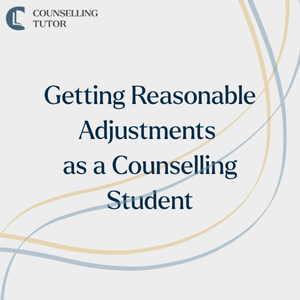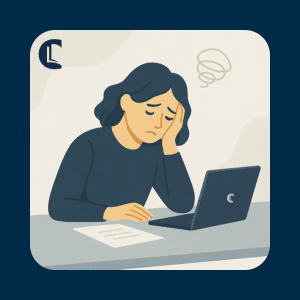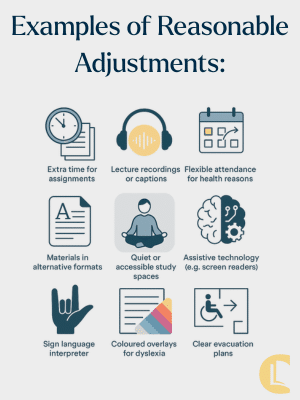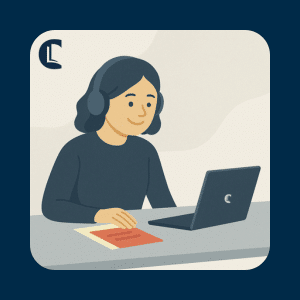Your Free Handout
Getting Reasonable Adjustments as a Counselling Student
Counselling training can be both rewarding and demanding. For students with disabilities or specific learning needs, it’s essential that learning environments are fair and accessible. Reasonable adjustments are designed to remove barriers so that all students can participate fully and succeed in their training. Yet, many students either don’t know they exist or hesitate to ask for them.
Understanding your rights and the process of requesting reasonable adjustments can help you approach your studies with confidence – and make your training experience smoother, safer, and more inclusive.

Getting Reasonable Adjustments as a Counselling Student
By reading this article, you will:
Reasonable adjustments are changes or accommodations made by a training provider to remove or reduce barriers faced by disabled students. They ensure that everyone has an equal opportunity to learn, participate, and demonstrate their abilities.

Under the Equality Act 2010, education providers in the UK are legally required to make reasonable adjustments to support disabled learners. This duty applies across all aspects of your counselling training, from interviews and classroom learning to supervision and placement.
Reasonable adjustments are not a favour or a special privilege; they are your legal right. They are designed to create fairness, not advantage. Importantly, adjustments are personal – they relate to what you need, not to your diagnosis alone.
The nature of adjustments varies depending on your individual circumstances and what is practical for your provider to implement.
Common examples include:
In some cases, adjustments can be straightforward. A student who is deaf or hearing impaired may require a sign language interpreter – a simple yet essential step that makes full participation possible.
Other adjustments may be less visible but equally important, such as coloured overlays for students with dyslexia, or clear evacuation plans for wheelchair users.

Many students feel anxious about requesting reasonable adjustments. Some worry that tutors will think less of them or that peers might view them as “less capable.”
Rory Lees-Oakes shared from his own experience as a dyslexic student:
I remember sitting there thinking, if I ask for reasonable adjustments, will my tutor think I’m a bit dim?
These fears are understandable, but they can prevent you from getting the support you deserve. Seeking adjustments is not a sign of weakness – it’s a professional step toward self-awareness and self-advocacy, both key qualities in becoming an effective counsellor.
It can help to prepare a few sentences in advance, such as:
Remember, most tutors genuinely want to support you. Good training providers will often encourage students to disclose their needs early and check in regularly to review what’s working.
Getting reasonable adjustments usually involves a few clear steps:
Reflect on how your condition affects your learning.
Most colleges and universities outline this in a disability or inclusion policy.
Some providers may request documentation, such as a diagnostic report or GP letter.
The sooner you start the conversation, the easier it is to plan support.
Ensure any arrangements are documented, often in a learning agreement or support plan.
Your needs may change as the course progresses.
If you’re unsure what to ask for, consider what would make learning easier or reduce stress. This is a collaborative process – an ongoing dialogue between student and tutor, not a one-off request.
Not every student feels equally able to disclose their needs. Cultural background, stigma, or fear of discrimination may all influence whether someone seeks help.
As a counselling student, you may find that exploring these barriers in supervision helps you understand your own process of self-advocacy.
Reflective questions such as:
…can open meaningful discussion in supervision and model the kind of self-awareness you’ll later encourage in clients.
Being open about your needs doesn’t just help you – it benefits your tutors and peers too. When adjustments are in place, everyone can focus on learning, not logistics.

Training organisations are audited to ensure they meet accessibility standards, meaning tutors are required to demonstrate they’ve supported students appropriately.
Moreover, understanding reasonable adjustments as a student prepares you for professional life. As a counsellor, you’ll encounter clients who need adjustments in your own practice, such as flexible session formats or sensory accommodations. Learning to advocate for yourself now mirrors how you’ll advocate for your clients in future.
Getting Reasonable Adjustments as a Counselling Student
You begin by identifying your needs, checking your provider’s disability or inclusion policy, gathering supporting evidence (for example a diagnostic report), contacting your tutor or the disability service early, and agreeing and documenting the adjustments in a learning/support plan.
Examples include extra time for assignments or exams, access to lecture recordings or captions, flexible attendance for health reasons, alternate formats of materials, quiet workspaces, and assistive technologies such as screen readers or speech‑to‑text tools.
Yes – under the UK’s Equality Act 2010, education and training providers must make reasonable adjustments to ensure disabled students are not placed at a substantial disadvantage.
Requesting reasonable adjustments can feel daunting, but it’s an important act of self-respect and professional responsibility, and reasonable adjustments exist to ensure you can reach your full potential.
A happy learner is an effective learner.
You have the right to an accessible, supportive learning environment. By asking for what you need, you’re not only upholding your own wellbeing but modelling inclusive practice for the clients and colleagues you’ll work with in future.
Equality Act (2010) UK Public General Acts. https://www.legislation.gov.uk/ukpga/2010/15/contents
Office for Students (2023) Supporting Disabled Students in Higher Education. https://www.officeforstudents.org.uk/for-providers/equality-of-opportunity/student-disability-guide-for-universities-and-colleges/
Disability Rights UK (2024) Reasonable Adjustments Guidance. https://www.disabilityrightsuk.org
Counselling Tutor provides trusted resources for counselling students and qualified practitioners. Our expert-led articles, study guides, and CPD resources are designed to support your growth, confidence, and professional development.
👉 Meet the team behind Counselling Tutor
Notice any broken link or issues with this resource? Kindly let us know by email
Email us